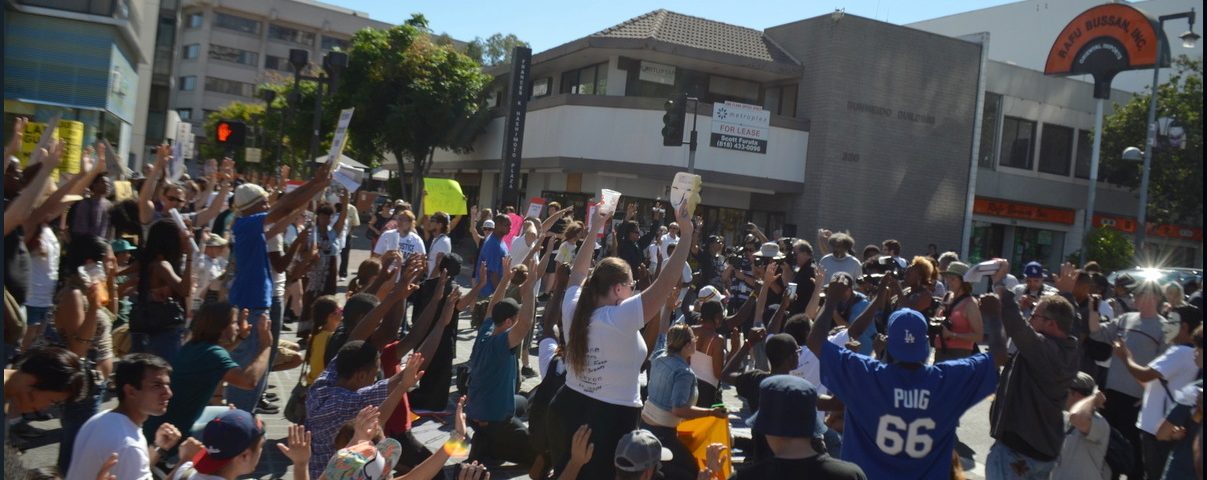by Luis Sifuentes, published on Fightback News, April 2, 2021
The LAPD recently shot six people in seven days. We also saw them unleash their violence last week in Echo Park against the unhoused community and allies, then call it a “service to the community.” And they’re trying to use their violence during last summer’s protests to secure more resources and powers, ignoring widespread demands to defund the police.
The LAPD’s so-called “oversight” body, the Mayor Garcetti-appointed LA Police Commission, has responded to this important moment by suppressing public comment and then canceling this week’s Tuesday meeting. [FB Ed]
In response, the community gathered in front of LAPD HQ.
The Community Service Organization was founded way back in 1947. CSO (or as we call ourselves now Centro CSO) was an important California Chicano and Latino civil rights organization. CSO was a source of political support for the Chicano community in Los Angeles and helped get Edward Roybal elected to LA City Council, the first Chicano since 1881 to serve in that role. Initially CSO focused on voter registration drives, citizenship classes, immigrant rights, police abuse lawsuits, legislative campaigns, and fighting back against police brutality.
Cesar Chavez is just one of many significant Chicano activists who trained with CSO. Dolores Huerta and Gilbert Padilla, central leaders of the UFW [United Farm Workers] alongside Chavez, were once members. Bobby Verdugo, a student leader of the 1968 East LA Walkouts, also organized with us.
CSO eventually expanded to have 42 chapters throughout California and three in Arizona. Chavez came into contact with CSO through the San Jose chapter where Fred Ross recruited him, while Huerta joined the one in Stockton. With CSO, Chavez learned many of the tactics he would later use as a union organizer. For example, house meetings. CSO and later the UFW would build credibility in our communities by leading meetings in people’s homes in the lead-up to a general meeting.
In 1959, Chavez moved to Boyle Heights to become our national director. In 1962, Chavez left CSO and moved to Delano with the aim of forming a labor union for farmworkers in the San Joaquin Valley. He brought his experiences from CSO, along with many leading members like Dolores Huerta and Gilbert Padilla, with him to the struggle to improve working conditions for farmworkers. They would form the National Farm Workers Association (NFWA), adopt the motto Viva La Causa (“long live the cause”) and the famous black eagle on a red and white flag.
In 1965, Filipino American Farmworkers, organized by the Agricultural Workers Organizing Committee, began the Delano Grape Strike. The NFWA quickly supported their efforts. One year later, the organizations merged to create the United Farm Workers. The campaign took five years of consumer boycotts, marches, community organizing, solidarity from groups like the Black-led Student Nonviolent Coordinating Committee. Eventually the people won: the grape growers signed union contracts.
Today, CSO continues to build Chicano power in our neighborhoods. We are prominent in defending public education against privatization and are strong, longstanding allies of UTLA [United Teachers Los Angeles]. We demand legalization for all immigrants — whether they be Mexican, Central American, African, Asian, etc. We hold annual May Day marches and International Women’s Day events.
As CSO did more than 70 years ago, we continue to struggle against police terror and racism, we promote unity with our Black siblings. We fight to jail killer cops. We fight back against Los Angeles Police and LA County Sheriffs as they terrorize our Raza. We fight to win justice for Jose Mendez, Jesse Romero, Edwin Rodriguez, Paul Rea, Anthony Daniel Vargas, Cesar Rodriguez, Daniel Hernandez, and all other victims of terror. We stand in solidarity with Black Lives Matter-LA and strive to build political power together.
Do not let LAPD use the excuse of Cesar Chavez Day to hide from us. Through struggle we’ve learned the importance of getting transparency from LAPD or LASD from the moment a killing or attack happens. Just before the George Floyd uprising, a community member in Boyle Heights filmed an LAPD officer viciously beating a homeless man in our neighborhood. BLM was able to get this officer’s name, Frank Hernandez, and we realized that he was the same cop we had organized against a decade ago when he killed Guatemalan immigrant Manuel Jamines. We circulated a petition calling for Hernandez’s firing, protested outside of Hollenbeck Station, and for once Jackie Lacey filed charges.
Through struggle we’ve learned that Hernandez’s history of repeated offenses against our community is not in any way unique. In 2016, Eden Medina chased after and then murdered unarmed father of two Omar Gonzalez. LAPD helped Medina clean up his story and let him keep on working. Less than two weeks later, Medina chased after and then murdered Jesse Romero, an unarmed 14-year-old. In 2018, Bandito [a gang within the LA Sheriff’s department] prospect Nikolis Perez killed Anthony Daniel Vargas in East Los Angeles. One year later, Perez killed George Serrano. In Minneapolis, Derek Chauvin had received 18 complaints and had killed one other person before he murdered George Floyd. By fighting to win justice for victims, we are fighting to prevent future murders.
*Featured Image: The protesters stopped regularly to put their hands up and chant “Don’t shoot” along the protest route. ~Joe Satran, Huffington Post
Fight Back News Service is circulating the following speech delivered by Luis Sifuentes, of Centro CSO, at the March 30 “The People Speak” event.
